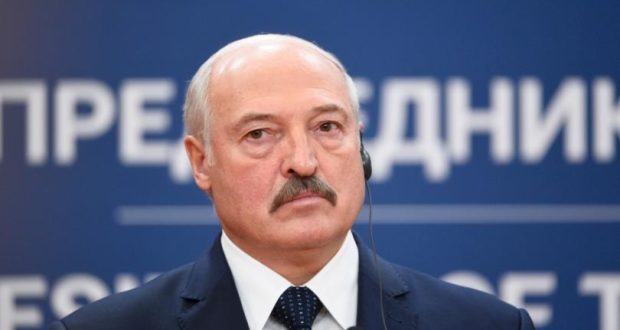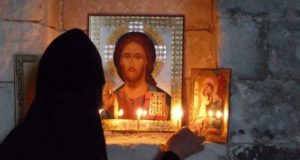الرئيس البيلاروسي: لن نرقص على أنغام أي شخص... 😀
من بين 9.5 مليون بيلاروسي،1263 فقط ماتوا بسبب COVID-19 والبلد مفتوح والنسبة 0.01%.. ورغم الإغلاق في انجلترا وويلز بيلاروسيا أقلّ 36 ٪.. 😉
مع قيام المملكة المتحدة ودول أوروبية أخرى بإصدار سلسلة من الإعلانات التي لا تنتهي على ما يبدو حول أزمات COVID الجديدة وإجراءات الإغلاق المتزايدة ، تواصل بيلاروسيا – الدولة التي لم تفرض أبدًا إغلاقًا صارمًا – الإبلاغ عن معدلات منخفضة لحالات COVID واقتصاد مزدهر نسبيًا .
بالعودة إلى شهر مارس من العام الماضي ، حيث بدأ عدد لا يحصى من البلدان في جميع أنحاء العالم في إغلاق اقتصاداتها وحجر مواطنيها “في الحال” ، خالف الرئيس ألكسندر لوكاشينكو الاتجاه باختياره عدم إغلاق اقتصاد بيلاروسيا على الإطلاق ، و استخدام نهج مستهدف لفحص وعزل الأفراد المصابين بفيروس COVID.
أفادت أكبر وكالة أنباء في بيلاروسيا ، BelTA ، أنه ، إلى جانب الفحص ، ساعد إعطاء الأولوية لنظام الرعاية الصحية من زيادة العبء في إبقاء أي تفشي تحت السيطرة: “ونظرًا للجهود الوقائية ، تمكنت بيلاروسيا من الحفاظ على الوضع في نطاق قدرة الموارد لنظام الرعاية الصحية. “
يبدو أن هذه الأساليب المتناسبة قد خدمت البلاد بشكل جيد على مدار عام 2020. تشير تقارير خارج الجارديان إلى أنه من بين 9.5 مليون مواطن في بيلاروسيا ، تم تسجيل 1263 فقط على أنهم ماتوا بسبب COVID-19. يمثل هذا الرقم أكثر بقليل من 0.01٪ من السكان.
قارن الموقع الإخباري عبر الإنترنت عدد الوفيات الزائدة خلال عام 2020 في بيلاروسيا ، التي تجنبت الإغلاق ، مع عدد الوفيات في إنجلترا وويلز ، التي فرضت إغلاقًا وطنيًا. عندما يتم احتساب الفرق السكاني ، كان لدى بيلاروسيا 36 ٪ أقل من الوفيات الزائدة من إنجلترا وويلز. تلاحظ صحيفة The Off Guardian أن هذا قد يعني أنه إذا كان لدى بيلاروسيا نفس معدل الوفيات الزائد مثل إنجلترا وويلز ، فقد لوحظت 3149 حالة وفاة أخرى في بيلاروسيا.
وفقًا لأحدث البيانات من Worldometer Belarus ، يبلغ معدل الوفيات 157 لكل مليون نسمة ، بينما يبلغ معدل الوفيات في المملكة المتحدة 1135 لكل مليون.
على الرغم من أن عددًا من وسائل الإعلام الرئيسية انتقدت لوكاشينكو ووصفه بأنه “متهور” لنهجه في عمليات الإغلاق ، فإن البيانات المتعلقة بمعالجة بيلاروسيا لـ COVID تشير إلى قصة مختلفة.
حتى الآن بيلاروسيا تتعامل مع هذا. قال لوكاشينكو في أبريل / نيسان 2020: “إن شاء الله ، سنواصل السير بهذه الوتيرة ، وكما يقول الخبراء ، سنعمل على تسطيح المنحنى وسقوط معدل الإصابة بالمرض بين السكان”.
“ولكن ماذا لو أوصونا ، دعنا نقول ، بفرض بعض الإجراءات حتى حظر التجول؟ أؤكد مرة أخرى: إذا ظهرت مثل هذه الحاجة ، فسوف نفرض حظر التجول ، وسنعزل المدن والبلدات والقرى. لكن هل البلد يواجه مثل هذه المشكلة اليوم؟ “
أجاب: “لا ، لا.” وقال الزعيم البيلاروسي ” لن نتجاهل التوصيات ، لكن يجب أن نتصرف بناءً على مجموعة من التوصيات ، وتجربتنا الخاصة”…
بعد عمليات الإغلاق الوطنية في جميع أنحاء العالم العام الماضي ، تواصلت بيلاروسيا مع صندوق النقد الدولي (IMF) للحصول على الدعم المالي وسط التباطؤ الاقتصادي العالمي ، في سعيها إلى حماية نفسها من مشاكلها المالية المحتملة. كانت بيلاروسيا واحدة فقط من حوالي 80 دولة طلبت مساعدة مالية فورية من المؤسسة من خلال “أداة التمويل السريع” ، وهي آلية يمكن للدول الأعضاء في صندوق النقد الدولي من خلالها تلقي المساعدة المالية الطارئة بسرعة.
لكن لوكاشينكو قال أن صندوق النقد الدولي اتصل به بعد ذلك بحزمة مالية تبلغ “عشرة أضعاف ما قدمه في البداية كعربون ثناء على كفاحنا الفعال ضد هذا الفيروس”. في مقابل حزمة “COVID Relief Aid” بقيمة 940 مليون دولار ، قال الرئيس إن صندوق النقد الدولي طلب منه فرض عدد من شروط الإغلاق القاسية على الجمهور.
رفض لوكاشينكو إدراج الشروط المرتبطة بالأموال ، وبالتالي لم تتلق البلاد أبدًا مبلغ 940 مليون دولار من المساعدات. وقال العام الماضي “أنا مقتنع بأننا قد نعاني من الذعر أكثر من الفيروس”.
وفقًا لصندوق النقد الدولي ، كان من المفترض أن ينخفض الناتج المحلي الإجمالي في بيلاروسيا بنسبة 4-6٪ في عام 2020 ، لكن مثل هذا الانهيار لم يتحقق ، حيث ظل الاقتصاد غير مضطرب إلى حد كبير خلال العام الماضي.
ويواصل صندوق النقد الدولي مطالبتنا بإجراءات الحجر الصحي والعزل وحظر التجول. قال لوكاشينكو العام الماضي “هذا هراء”. “لن نرقص على أنغام أي شخص.”
“نسمع المطالب ، على سبيل المثال ، نموذج الإستجابة حول إجراءات فيروس كورونا في إيطاليا. لا نريدها أن تتكرر في بيلاروسيا. قال الرئيس “لدينا بلدنا ووضعنا خاص”.
إعترف مدير الاتصالات في صندوق النقد الدولي ، جيري رايس ، في إيجاز صحفي في سبتمبر من العام الماضي ، بأنه “لم يتم التوصل إلى اتفاق ، ولم نجد طريقة لتجاوز الخلافات المهمة حول الاستجابة المناسبة للتحديات الحالية” أثناء ترتيب الإغاثة من فيروس كورونا. وأضاف قائلاً: “لقد سعينا [صندوق النقد الدولي] للحصول على تأكيدات بشأن خطوات احتواء الوباء بما يتماشى مع توصيات منظمة الصحة العالمية”.
إرشادات منظمة الصحة العالمية ، التي يعتمد عليها صندوق النقد الدولي لتوزيع التمويل الطارئ لفيروس كورونا ، للدول التي تنفذ تدابير COVID-19 واردة في وثيقة بعنوان “اعتبارات في تعديل الصحة العامة والتدابير الاجتماعية في سياق COVID-19″. تنص المبادئ التوجيهية على أن الحكومات “تضمن اتخاذ تدابير الصحة العامة مثل العزل والحجر الصحي للحد من انتشار المرض”. وتشير الوثيقة أيضًا إلى أن الحكومات تفرض “ارتداء قناع عند الاقتضاء، والمسافة الجسدية” عند أدنى مستويات الخطر المتصور لانتشار الفيروس.
مع زيادة خطر الانتشار المتصور ، تقترح المبادئ التوجيهية تدابير مثل “[c] إغلاق الشركات غير الأساسية أو العمل عن بعد قدر الإمكان” ، و “[i] يجب على الأفراد البقاء في المنزل والحد من الاتصال الاجتماعي مع الناس من خارج المنزل “.
تتناقض تجربة بيلاروسيا بشكل صارخ مع تجربة جيرانها في أوروبا ، الذين أدى إغلاقهم للحدود الوطنية ووقف الصناعة إلى انهيار اقتصادي قياسي.
شهدت بريطانيا أكبر تراجع اقتصادي في تاريخها المسجل ، وأكبر انخفاض بين أكبر اقتصادات العالم ، وفقًا لمنظمة التعاون الاقتصادي والتنمية (OECD). خلال ذروة الإغلاق الوطني ، بين أبريل ويونيو ، سجلت المملكة المتحدة انكماشًا بنسبة 20.4٪ في النمو الاقتصادي ، تليها إسبانيا ، بنسبة 18.5٪. فرض هذان البلدان المزدهران قيودًا صارمة للإغلاق في مارس من العام الماضي ، مع تطبيق إسبانيا لشروط كورونا من خلال وضع الجيش في الشوارع.
David McLoone
المصدر: lifesitenews.com
Example of Belarus appears to further highlight the folly of national lockdowns
President Aleksander Lukashenko claims that last year he rejected an offer of nearly $1 billion from the IMF in exchange for imposing a hard lockdown on the country
David McLoone is a journalist for LifeSiteNews based in Glasgow, Scotland, and is a liberal arts graduate of Thomas More College in New Hampshire. David is a cradle Catholic who has a great love of the traditional Mass and sacraments
MINSK, Belarus, January 7, 2021 (LifeSiteNews) – With the U.K. and other European countries making a seemingly never-ending series of announcements about new COVID crises and increased lockdown measures, Belarus – a country which has never imposed a hard lockdown – continues to report low rates of COVID cases and a comparatively prospering economy.
Back in March last year, as countless countries across the globe began to shut down their economies and mask up their citizens “just-in-case”, President Aleksander Lukashenko bucked the trend by opting not to close down Belarus’ economy at all, and employing a targeted approach to screening and quarantining COVID positive individuals.
Belarus’ largest news agency, BelTA, reported that, alongside screening, prioritising the healthcare system from being overburdened helped keep any outbreak under control: “[t]hanks to the preventive efforts and the bed space reserve, Belarus has been able to keep the situation within the scope of the resource capacity of the healthcare system.”
These proportional methods appear to have served the country well throughout the course of 2020. Off-Guardian reports that, of the 9.5 million citizens in Belarus, only 1,263 are recorded as having died from COVID-19. That number accounts for little more than 0.01% of the population.
The online news outlet contrasted the number of excess deaths during 2020 in Belarus, which avoided lockdown, with that in England and Wales, which did impose a national lockdown. When the population difference is accounted for, Belarus had 36% less excess deaths than England and Wales. The Off Guardian notes that this would mean that if “Belarus had the same excess death rate as England and Wales another 3,149 deaths in Belarus would have been observed.”
According to the latest data from Worldometer Belarus has a death rate of 157 per million population, whilst the U.K. has a death rate of 1,135 per million.
Although a number of mainstream media outlets have lambasted Lukashenko as “reckless” for his approach to lockdowns, the data on Belarus’ handling of COVID suggests a different story.
“So far Belarus is coping with this. God willing, we will keep going at such a pace, and as experts say, flatten the curve and have the incidence of the disease fall among the population,” Lukashenko said back in April 2020.
“But what if they, let’s say, recommend us to impose some measures up to the curfew? I stress once again: if such a need arises, we will impose the curfew, isolate cities, towns and villages. But is the country facing such a problem today?”
“No, it doesn’t,” he answered. “Therefore, we will not shrug off the recommendations, but we must act accordingly, based on a set of recommendations, our own experience” the Belarussian leader said. Referencing the harsh lockdown restrictions imposed by his European counterparts, Lukashenko said that there “is no room for hit-or-miss or just-in-case strategies.”
Following worldwide national lockdowns last year, Belarus reached out to the International Monetary Fund (IMF) for financial support amid the global economic downturn, seeking to buffer itself against its own potential financial troubles. Belarus was only one of around 80 countries that had requested immediate financial aid from the institution through its “Rapid Financing Instrument,” a mechanism by which IMF member states can quickly receive emergency financial assistance.
But Lukashenko claimed that the IMF then approached him with a financial package worth “ten times more than it offered initially as a token of commendation for our efficient fight against this virus.” In exchange for a “COVID Relief Aid” package worth $940 million, the president said that the IMF required him to impose a number of harsh lockdown conditions on the public.
Lukashenko has refused to incorporate the conditions attached to the money and the country has thus never received the $940 million aid fund. “I am convinced that we may suffer more from panic than from the virus,” he said last year.
According to the IMF, Belarus’ GDP was supposed to dip by 4-6% in 2020, but such a crash has not materialised, with the economy remaining largely unperturbed during the course of the past year.
“The IMF continues to demand from us quarantine measures, isolation, a curfew. This is nonsense,” Lukashenko said last year. “We will not dance to anyone’s tune.”
“We hear the demands, for example, to model our coronavirus response on that of Italy. I do not want to see the Italian situation to repeat in Belarus. We have our own country and our own situation,” the president said.
The IMF’s director of communications Gerry Rice admitted, in a press briefing in September last year, that “no agreement was reached, and we have not found a way to bridge significant differences about the appropriate response to the present challenges” whilst arranging a COVID relief package with Belarus. He added that “we [the IMF] sought assurances for steps to contain the pandemic in line with WHO recommendations.”
The WHO’s guidance, which the IMF relies on for distributing emergency COVID funding, for nations implementing COVID-19 measures is contained in a document entitled “Considerations in adjusting public health and social measures in the context of COVID-19.” The guidelines stipulate that governments “ensure public health measures such as isolation and quarantine are undertaken to reduce onward spread.” The document also suggests that governments enforce “wearing a mask where appropriate, and physical distancing” at the lowest levels of perceived risk of the spread of the virus.
As the perceived risk of spread increases, the guidelines suggest measures such as the “[c]losure of non-essential businesses or remote working as much as possible,” and that “[i]ndividuals should stay at home and limit social contact with people outside the household.”
The Belarussian experience contrasts starkly with that of its neighbors in Europe, whose closing of national borders and halting of industry has seen record economic crashes.
Britain has seen the largest economic slump in its recorded history, and the largest drop amongst the biggest world economies, according to the Organisation for Economic Co-operation and Development (OECD). During the height of the national lockdown, between April and June, the U.K. recorded a 20.4% contraction in economic growth, followed by Spain, at 18.5%. These two normally prosperous countries both instituted tight lockdown restrictions in March last year, with Spain enforcing the regulations by placing the army on the streets.
 Agoraleaks Agoraleaks
Agoraleaks Agoraleaks







